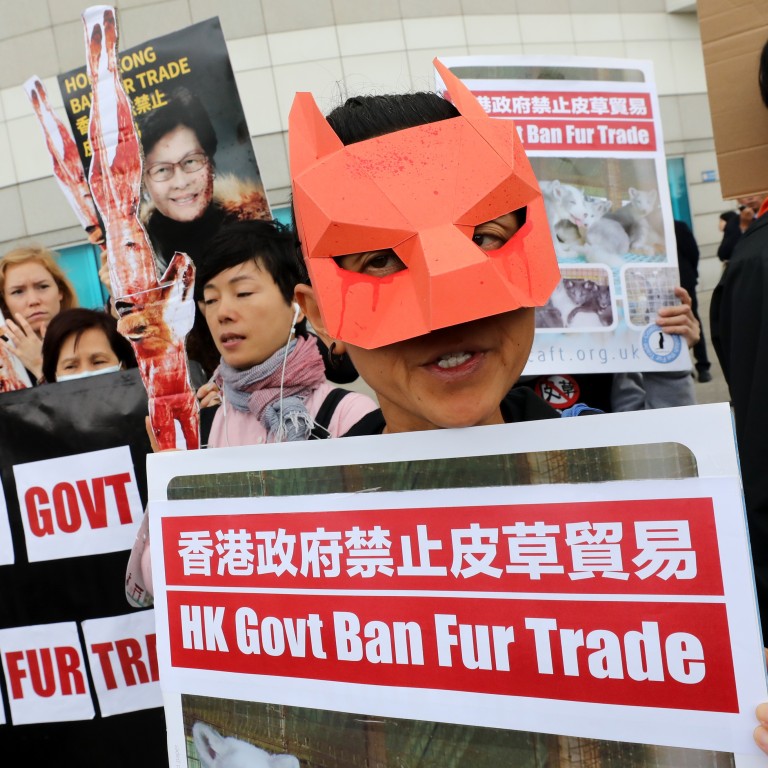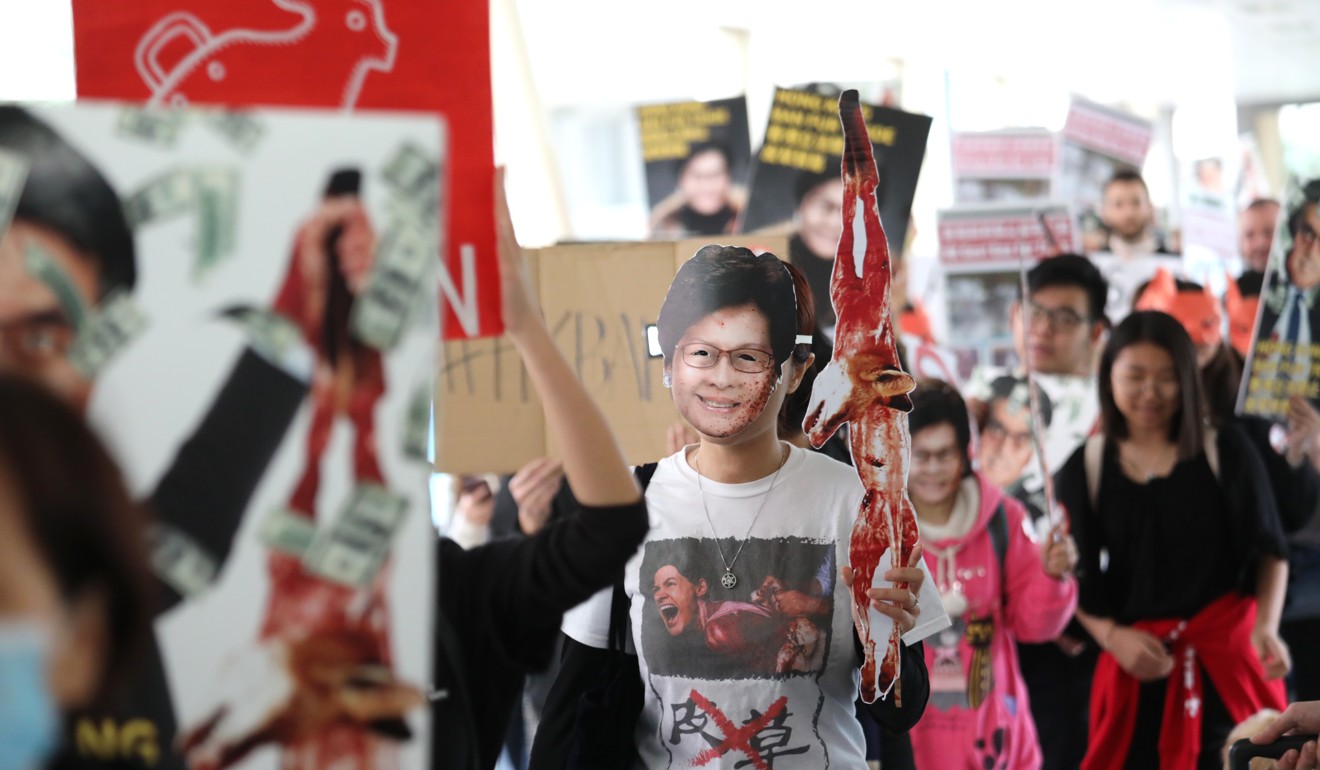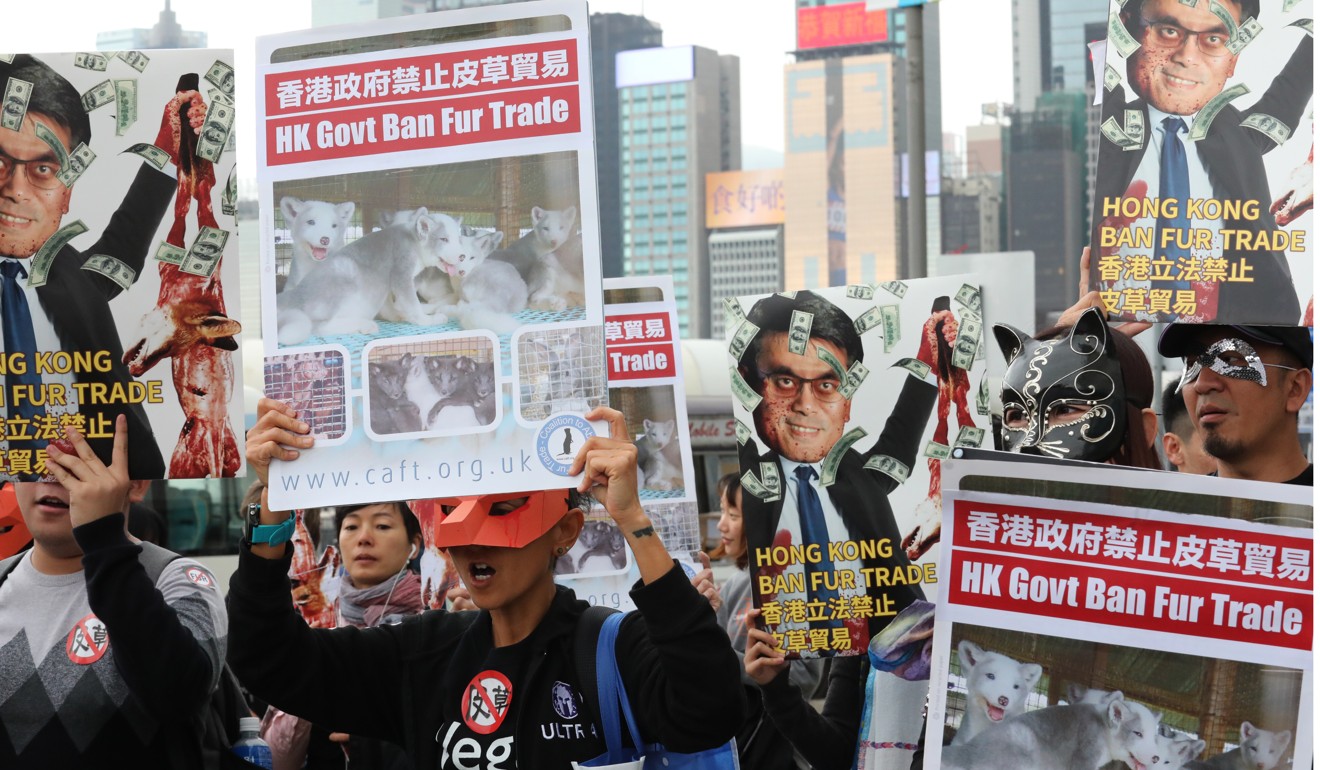
Fur trade in Hong Kong: animal rights activists call on government to ban industry in city during annual protest
- Dozens gather for rally and say government is an accomplice if it doesn’t ban the business
- Hong Kong Fur Federation says its members have agreed to protect well-being of animals including to stand against cruelty
Animal rights activists called on the government to ban the fur trade in Hong Kong during an annual protest against the industry on Sunday afternoon.
Around 90 protesters, who were joined by three lawmakers, chanted slogans and carried banners displaying messages such as “Fur is crime” and “Ban the Hong Kong fur trade” after they gathered in Wan Chai for a rally.
The marchers stopped outside the nearby Hong Kong Convention and Exhibition Centre, where the annual four-day international fur fair is being held until Monday.

“The reason we made masks of Lam and Yau is we want to let the government know it is an accomplice of the fur trade if it doesn’t ban the business,” campaign leader Wendy Chan said.
The fur trade is persecution against animals. Is fur really necessary? I don’t think so
She said their repeated requests to meet Yau over the issue were rejected by the Commerce and Economic Development Bureau.
The protesters ended their march at government headquarters in Admiralty and for the first time handed in a petition to a government representative.
The Hong Kong Fur Federation, which represents more than 150 firms from all sectors of the industry, said its members agreed to protect the well-being of animals including to stand against cruelty and to cooperate with suppliers that followed local animal welfare regulations.
The anti-fur protest is in its sixth year.
Ponies ‘tortured’ in the name of entertainment
“Since last year, we have asked the government, rather than the industry, to stop the fur trade through legislation,” Chan said.
Pro-democracy lawmakers Au Nok-hin, Eddie Chu Hoi-dick and Claudia Mo Man-ching joined the protest.
“The fur trade is persecution against animals. Is fur really necessary? I don’t think so,” Au said. “Hong Kong is an international city. We should not let the trade prevail in Hong Kong.”

Chu added that although Hong Kong was not a manufacturing base for fur, it was a free port with lots of products passing through. “We should not let the name freedom be abused,” he said.
Mo said: “We are not radicals. We are not going to confront people in the streets as though they’re criminals. But it is Hong Kong’s turn at least to seriously to consider that we should drop all fur.”
She said the fake version used in clothing should also not be tolerated because it sent a message that fur represented fashion.
Are Hong Kong’s laws on animal abuse and neglect outdated?
River Chan, a protester who joined the campaign in 2014, echoed these sentiments.
“Hong Kong is warm. There is no need for people to wear fur at all. There are so many materials that can be used for clothes instead. It’s so cruel to animals,” Chan said.
The protesters argued that fur products were neither ethical nor sustainable as they involved animal abuse and hazardous chemicals. Countries such as Britain and Japan have banned fur farming and some US cities, including Los Angeles and San Francisco, have banned fur sales.
Hong Kong is warm. There is no need for people to wear fur at all
Fur federation vice-chairman Dennis Fong said the industry condemned any behaviour that constituted animal cruelty, in line with the public.
Fong said he respected people’s choice not to buy fur but that it would not be fair if the whole industry in Hong Kong folded because of such a stance. He also argued the industry was environmentally friendly and sustainable because by-products such as meat and fat could also be used for making animal feed and perfume, for example.
According to Trade Development Council information from July 2018, Hong Kong was the world’s third largest fur clothing exporter and a major source of quality fur garments and accessories globally. A large proportion of Hong Kong’s fur-skin exports were re-exports from overseas countries to mainland China for clothes production.
The leading markets of Hong Kong’s fur clothing exports were the European Union, South Korea and Canada, which accounted for almost two-thirds of the total in the first five months of 2018.
